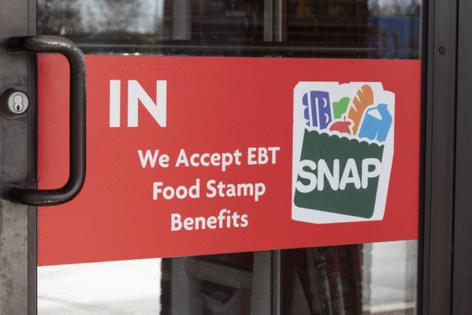Missouri set to launch work requirements for food stamps
Published in News & Features
JEFFERSON CITY, Mo. — A new work requirement for food stamp recipients goes into effect Saturday even as the federal Supplemental Nutritional Assistance Program is set to halt benefits to more than 650,000 Missourians if the government shutdown continues.
Beginning Nov. 1, the day SNAP is set to run out of money because of the partisan impasse in Congress, able-bodied food stamp recipients will be required to start showing the state they meet new work requirements, which include at least 80 hours of employment or participation in a training program every month.
Individuals will receive three months of SNAP food benefits, but the subsidy will end if they do not provide proof of compliance with the work requirements.
The new rules are part of the federal budget bill passed by Congress and signed into law by President Donald Trump in July.
SNAP benefits are 100% federally funded through the U.S. Department of Agriculture, but are administered in the state by the Missouri Department of Social Services.
Officials acknowledge the confusion and worry the shutdown has caused for recipients, but said people should continue to apply for benefits in November in anticipation of the shutdown coming to an end.
“We understand the uncertainty caused by the shutdown,” said Mandi Adams, director of the agency’s Family Support Division. “FSD’s team is committed to keeping Missourians informed of any changes.”
Gov. Mike Kehoe Wednesday announced plans to redirect some federal funds to prop up food distribution programs while SNAP benefits are suspended.
The governor moved $10.6 million out of a reserve fund to the Missouri Area Agencies on Aging to boost the number of meals the local agencies are able to provide to seniors and used a separate fund to divert $5 million to food banks, which are seeing an increase in need due to inflation and the shutdown.
“While the State of Missouri cannot fully replace federal SNAP benefits for those who rely on them, we are working to expedite additional funding sources to assist Missouri’s senior population and food banks,” Kehoe said.
Roughly 10% of Missouri’s population, more than 650,000 people, receive SNAP benefits. The Center on Budget and Policy Priorities, which analyzes the impact of federal and state government budget policies, estimates the work requirements could affect benefits for 150,000 of those.
The requirements, as well as a change in the share of how much the federal government pays states for SNAP and Medicaid, will result in an estimated $2.4 billion increase in annual costs to Missouri taxpayers. Those projected increases include the cost of converting computer programs and hiring additional workers to administer the programs, according to the Missouri Budget Project, an organization that monitors and analyzes state funding.
More than 42 percent of Missouri’s SNAP participants lived in households where someone worked in 2023, according to the Missouri Foundation for Health. The remaining 58% were adults 60 and older, children or people with disabilities.
The average monthly benefit for a household is $397, while the average for an individual is $196. The total cost of the subsidy in Missouri is $1.5 billion annually.
Under the new law, the upper age limit for SNAP work exemptions changes from 55 to 65, meaning individuals between the ages of 55 and 64 no longer will be exempt from work requirements based on age alone.
The exemption based on the age of a child living with a recipient also is changing from 18 to 14, as is an exemption for those who are homeless and veterans.
An exemption for those who were in foster care on their 18th birthday also ends Nov. 1. That means recipients no longer are exempt from work requirements until age 24.
The changes, which come amid the ongoing shutdown, have raised alarm bells among budget analysts and poverty experts.
“Taking any of these already very sparse resources away for folks who are under resourced and in an economy where wages remain stagnant… is a lot like Jenga. It does not take much for the whole thing to come crashing down,” said Christina Ryder, co-founder of the Center for Ozarks Poverty Research at Missouri State University. “People will go hungry, people will absolutely suffer. If we do not address food and healthcare and surrounding needs, people will die.”
“Taking away food from families during the month of Thanksgiving is a particularly horrendous outcome of the president’s policies and will hit Missouri families especially hard,” said Amy Blouin, president of the Missouri Budget Project.
Supporters say the changes will move people off welfare programs.
“For too long, millions of able-bodied adults have been trapped in a cycle of government dependency with no incentive to work. Hardworking taxpayers should not be forced to subsidize benefits for those who are fully capable of providing for themselves,” said U.S. Rep. Eric Burlison, a Republican who represents southwest Missouri.
St. Louis residents turn to food banks amid aid cuts. 'Everything you need is going up'
A grandmother who has seven family members living with her. A woman who's four months behind on her mortgage. A family displaced by May's tornado in St. Louis.
The state does not have a backup plan to help hundreds of thousands of low-income Missourians if a federal food program runs out of money in 10 days.
-----------
©2025 STLtoday.com. Distributed by Tribune Content Agency, LLC.







Comments